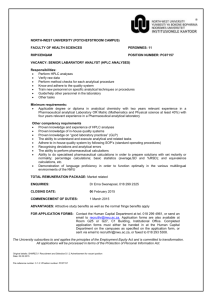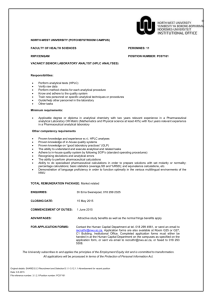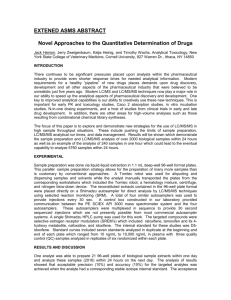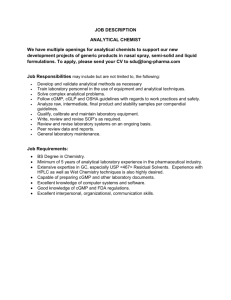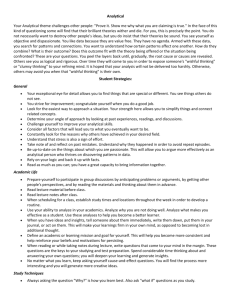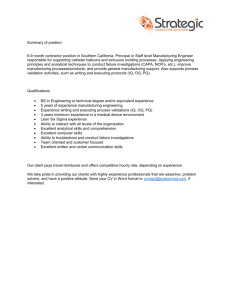Pharmaceutical Analysis MSc/PgDip/PgCert FT PT
advertisement
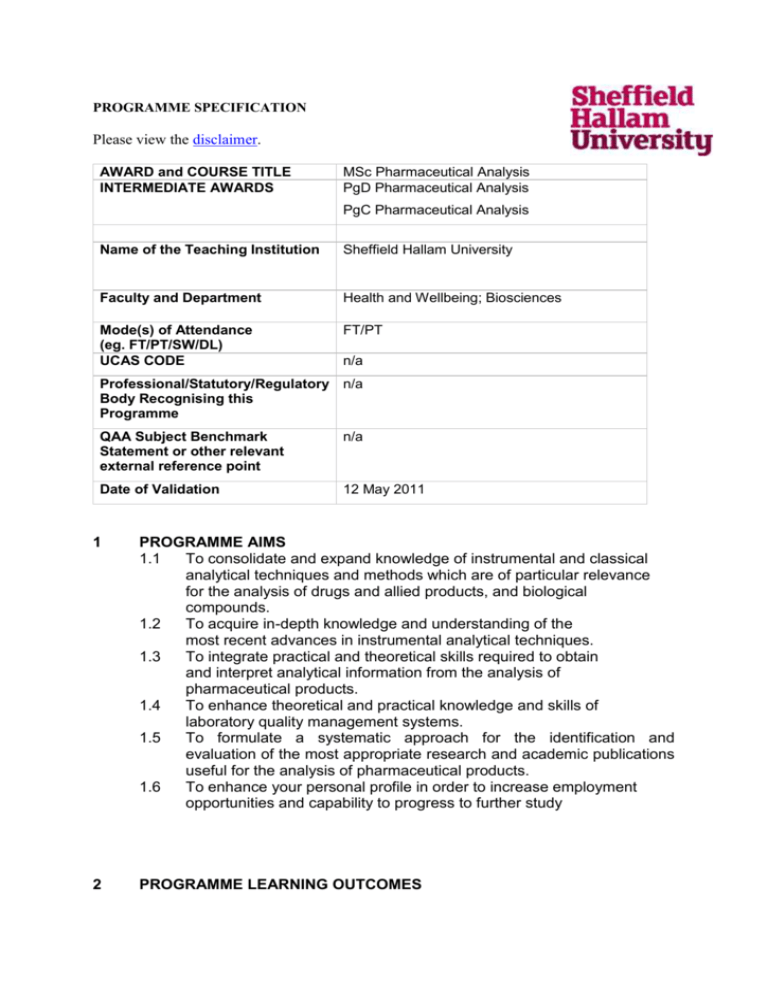
PROGRAMME SPECIFICATION Please view the disclaimer. AWARD and COURSE TITLE INTERMEDIATE AWARDS MSc Pharmaceutical Analysis PgD Pharmaceutical Analysis PgC Pharmaceutical Analysis Name of the Teaching Institution Sheffield Hallam University Faculty and Department Health and Wellbeing; Biosciences Mode(s) of Attendance (eg. FT/PT/SW/DL) UCAS CODE FT/PT n/a Professional/Statutory/Regulatory n/a Body Recognising this Programme QAA Subject Benchmark Statement or other relevant external reference point n/a Date of Validation 12 May 2011 1 PROGRAMME AIMS 1.1 To consolidate and expand knowledge of instrumental and classical analytical techniques and methods which are of particular relevance for the analysis of drugs and allied products, and biological compounds. 1.2 To acquire in-depth knowledge and understanding of the most recent advances in instrumental analytical techniques. 1.3 To integrate practical and theoretical skills required to obtain and interpret analytical information from the analysis of pharmaceutical products. 1.4 To enhance theoretical and practical knowledge and skills of laboratory quality management systems. 1.5 To formulate a systematic approach for the identification and evaluation of the most appropriate research and academic publications useful for the analysis of pharmaceutical products. 1.6 To enhance your personal profile in order to increase employment opportunities and capability to progress to further study 2 PROGRAMME LEARNING OUTCOMES 2.1 Knowledge and understanding covered within the Programme. By the end of the programme you will be able to 2.1.1 critically discuss the fundamental principles of key analytical instrumental techniques used in a modern chemical laboratory 2.1.2 use proficiently and interpret chemical data obtained from a variety of analytical techniques 2.1.3 validate analytical methods for the determination of a range of compounds and elements in a variety of samples of pharmaceutical interest 2.1.4 work effectively within the framework and meet the requirements of laboratory quality systems 2.1.5 undertake structure elucidation of chemical compounds by combining spectroscopic information with other analytical results 2.1.6 demonstrate and discuss analytical techniques used to identify organic and inorganic moieties with reference to physiological and toxicological effects 2.1.7 for a defined research problem in pharmaceutical analysis, design and execute a programme of work for its study selecting, developing and using appropriate techniques for its investigation 2.2 Intellectual/Subject/Professional/Key skills covered within the Programme: by the end of the programme you will be able to Intellectual skills 2.2.1 systematically analyse concepts and processes associated with the determination of active ingredients and contaminants in pharmaceutical products 2.2.2 select and critically evaluate relevant information to provide solutions to qualitative and quantitative problems 2.2.3 integrate information from different disciplines for the development of analytical methods 2.2.4 interpret and critically evaluate scientific findings and apply them to underpin novel research 2.2.5 formulate and justify decisions in relation to analytical measurements based on objective assessments. Subject/Professional Skills 2.2.6 analyse and interpret complex information and data related to analytical instrumental measurements in particular 2.2.7 apply good experimental design and select and use statistical methods for data evaluation 2.2.8 develop, optimise and evaluate validated analytical methods 2.2.9 use critically the principles of good laboratory practice, work to international quality standards, and understand the concept of laboratory accreditation. 2.2.10 competently plan, design and carry out laboratory experiments Key Skills 2.2.11 rationally and realistically formulate study goals and identify appropriate means of achieving them 2.2.12 prioritise tasks and manage time efficiently 2.2.13 work effectively in a team 2.2.14 communicate scientific information effectively both verbally and in writing 2.2.15 apply IT skills to retrieve analyse and interpret both information and data. 2.2.16 integrate information from different scientific disciplines. 3 LEARNING, TEACHING AND ASSESSMENT Learning, teaching and assessment for students is based firmly on the principles set out in the University's Learning and Teaching Strategy (2006-2010). The aim of the strategy is to "foster collaboration between students and staff to ensure that successful learning takes place in a diverse and vibrant learning community". This is achieved by a focus on the following three themes. Being forward-thinking in the design of our courses and programmes in supporting lifelong learning and anticipating and responding to changes in demand and need, providing vibrant and challenging learning opportunities Enhancing students’ learning experience, making assessment activities, support and feedback a powerful integrated feature of learning Introducing a comprehensive professional development framework that improves practice and promotes excellence in learning, teaching and assessment. Approaches to Learning, Teaching and Assessment (LTA) are driven by these themes and are described in the following sections. 3.1 3.1.1 The approach to Learning and Teaching within the Programme Tutor-led, tutor directed and student directed learning All modules will include a range of tutor-led, tutor directed and student-directed activities. Core principles will be delivered in lectures and will provide the background information required to actively participate in the classroom activities e.g. oral presentations, group analysis of research papers, discussion of scientific and related issues, case studies and problem solving activities. These activities will also be extended by tutor directed learning and students own background reading. The programme will be delivered by staff from the Biosciences Department at SHU and external specialist lecturers where there is a need to ensure provision of specialist material. The balance towards student directed learning will increase as students progress successfully through the modules and become more independent learners. This will be enabled by the development of breadth and depth of knowledge, key and professional skills. Development of professional skills will occur more formally in the Professional Development and Research Methods and Statistics modules, mainly via tutor-directed activities. The Research Project module is essentially student-directed with input from project supervisors for initial guidance, monitoring of progress and providing feedback on draft material. This module represents the sophisticated application of academic, key and professional skills including critical review and analysis, problem solving, data analysis and interpretation. 3.1.2 The virtual learning environment The virtual learning environment (VLE), Blackboard, is accessed via a student portal, SHUspace, which in addition to Blackboard, provides access to databases, the library catalogue, assessment regulations and information about a whole range of University services including student support. The VLE is available to support and enhance face to face and independent learning. All modules have accompanying Blackboard sites which support learners with high quality learning opportunities and a wealth of information to support the successful completion of module learning outcomes. This use of the VLE will enhance student learning by enabling access to learning materials at a time and place appropriate to the student. Guidance and support for use of the VLEs is provided from induction onwards. Blackboard will also be used as a means of communication between staff and students and between students via e-mail and discussion boards to facilitate group work and discussion and problem solving of all kinds. This aspect of learning and teaching strategy promotes the exchange of good practice from home based and overseas based students and assists in producing effective professionals . Use of Turnitin, a leading academic plagiarism detector, accessed via Blackboard, will be encouraged as a learning tool to allow students to check for themselves the originality of their work. Tutors will also use this software to detect potential plagiarism in coursework. Its use will be according to Departmental policy. The use of Grade Centre via Blackboard will allow students to obtain marks in a timely manner. 3.1.3 Laboratory-based practical or other distinctive learning environments. Laboratory based practical work is a core component to many modules. It is recognised that the gaining of practical experience is a key driver for students undertaking postgraduate study in science due to its central role in the enhancement of employability and the development of critical and problem solving skills. Practical classes are used to demonstrate and develop skills in key laboratory techniques, data handling and analysis. Selective laboratory based activities introduce the newest technological advances and expand experimental proficiency. These activities enable the development of the ability to effectively manage time and plan work in a laboratory setting. The research project constitutes a major part of the laboratory work in this programme and may be carried out in the workplace for part-time students and in the University laboratories for full-time students. The project, in addition to requiring the application of practical skills, requires critical thinking, problem solving, time management, communication and analytical skills which have been developed throughout the programme. Students are supported in their project by the module tutor, project supervisor, and, for part-time students, a workplace supervisor. Projects are further supported by a team of highly qualified and professional technical staff who deliver technical workshops and support throughout the period devoted to research projects. 3.1.4 Support for student learning An extended induction programme helps introduce all students to studying at the postgraduate level. Initially they are introduced to the library, IT and study skills. Referencing skills such as literature searching, Refworks® etc are further developed in later tutorial sessions, as part of the extended induction and further help is available via Learning and Information Services (LIS). The extended induction includes an introduction to the laboratories and to basic laboratory techniques and Health and Safety procedures. Additional learning support is available for International students. The University’s International Orientation Programme helps introduce overseas students to living and studying in the UK. International students also attend additional tutorials which develop a mix of academic and study skills to help in their transition to the more independent learning required for postgraduate study in the UK. Where English is a second language, opportunity is provided to improve this by access to the University English Scheme. Proficiency in English is important as this underpins all aspects of the programme. Support will also be available for students with particular learning needs or disabilities. They are made aware of the specific SHU support and systems available and modified approaches to learning and assessment will take into account individual needs. 3.1.5 Autonomous Learning The programme will include a variety of learning experiences throughout to develop students into autonomous learners. Students are encouraged to explore ideas and experiences throughout the programme and are regularly challenged by academic staff and peers to question, explain and explore topics under consideration. The complexity of the modern bioscience industry requires professionals who understand the need to work autonomously yet within the framework of a team. In particular the use of a blend of learning activities including face to face and e-learning activities, will encourage both active and autonomous learning. Key skills, developed initially in modules such as Research Methods and Statistics and Professional Development and to higher levels in the project report, will provide students with the tools for learning autonomy. The gradual move from tutor led to student-centred learning in modules will develop autonomy. Guidance from tutors, reflection on students progress and feedback from both formative and summative assessments will enable this transition. 3.1.6 Professional Development It is well recognised that postgraduate study for both home and overseas students is undertaken in order to enhance career prospects. This prerogative has been reflected in the design of the programme. This programme includes a process of personal and professional development (PPD) that will assist students in reviewing and reflecting on their progress towards the acquisition of key personal and professional skills. Whilst these skills are embedded throughout the courses they are specifically addressed in Professional Development module. In addition some of the lectures and material used in selected modules will be delivered by visiting academic researchers, senior NHS Biomedical Scientists and pharmaceutical industry professionals to ensure that students professional and academic knowledge is at the cutting edge of their chosen degree. 3.1.7 Staff development To enhance students overall learning experience, staff teaching on the programme have access to staff development as a central component of the Faculty of Health and Wellbeing’s Learning, Teaching and Assessment (LTA) modernisation agenda. The Head of LTA, supported by Staff with LTA responsibilities in each professional group, drive the commitment to ongoing developments in learning, teaching and assessment to enhance programme delivery. This has included peer supported review and promotion of a regular LTA group which has encouraged and disseminated good practice within the department. Departmental Away days have an element of LTA included to ensure that the team receive the most current information to incorporate into their delivery. 3.2 The approach to Assessment and Feedback within the Programme 3.2.1 Assessment All assessment activity is used to enhance learning. Module assessment strategies will include assessment activities aimed purely at enhancing learning as well as summative assessment, assessment for grading, that serves an additional function of assessing the extent to which learning outcomes have been achieved. 3.2.1.1 Learning outcomes and assessment Module assessment is designed to ensure that all specified learning outcomes are achieved. Students will be made aware of the criteria on which assessments are based at the time of being given the assessment by the module tutor. These will relate to learning outcomes. 3.2.1.2 Assessment for Learning: formative and summative assessment Assessment is an important part of the learning process, enabling students to reflect on their progress and achievements in order to improve performance. Different assessment activities, both formative and summative, occur at different points in modules to support student's learning. Additional information on assessment is in the module descriptors. Formative assessments, which do not carry grades, may include problem solving exercises, exercises on blackboard and writing of draft assignments or plans for work for which learning will be consolidated by verbal, written or electronic feedback. A variety of summative assessments, which are used for grading, are used to test different aspects of students learning to ensure students have achieved the learning outcomes of a module. These will include: Examinations. These are retained to ensure the acquisition and deep understanding of a body of knowledge and the ability to apply this knowledge. This is important for students professional development and employability. Examinations will have a variety of formats including seen questions, data handling and essay type questions covering specialist areas. Written assignments. These will include essay-type formats or case studies researching specialist areas or analysis and interpretation of scientific papers. They will develop skills of literature searching and its critical review, professional skills and the ability to grasp a range of scientific concepts. Oral, poster or other media-based presentations eg websites. These are important determinants of an understanding of scientific concepts, the ability to communicate scientifically and the use of IT skills. Tutor and/or peer assessment will be used for this type of assignment. Project reports. These assess the ability to communicate scientifically, retrieve information, select what is relevant and critically review it. Project reports require appropriate analysis and interpretation of information and data. Portfolios. These will enable the assessment of development of Personal and Professional Development Planning aspects of project planning and reflective learning and self awareness. 3.2.1.3 The distribution of assessment activity Formative activities, which do not carry marks, will be used earlier in modules to support subsequent summative activities such as written coursework or examinations. Where module assessment is via coursework and examination, coursework timing will be such that students will receive written feedback on this prior to the examination to enhance learning and subsequent performance. The Department of Biosciences is using the Assessment Management system to manage assessments across the programme. This will help to ensure assessment activity is distributed as evenly as possible throughout the programme to prevent overloading and facilitate a deeper approach to learning. This will also help to manage the student expectations regarding the return of feedback. All assessments which contribute to the module mark will be available to students at the start of each module, along with instructions and guidance, allowing students to manage their time more effectively in order to meet deadlines. The assessment loading and work distribution will be reviewed by the programme team on an annual basis to ensure an appropriate student experience. 3.2.2 Feedback Timely feedback on assessments is important to enable students to reflect on it and improve their performance, a feed forward effect. Feedback will normally be given within four working weeks of submission. It will be constructive, focussing on learning achieved as well as indicating where improvement is necessary. It should also give suggestions of how learning could be improved. Feedback will be linked to assessment criteria and learning outcomes providing students with input as to how well learning outcomes are being achieved. Students will be informed when to expect feedback through the assessment management system. Feedback will be given in a variety of ways. For formative non-assessed exercises it may be given directly verbally, for example in tutor-led sessions either individually or to the group as a whole, depending on the exercise. For exercises on Blackboard, feedback may be given directly electronically. For group exercises such as group posters or oral presentations, feedback will not only be from tutors but from student peers either verbally or via a criterion-based assessment sheet. Feedback from peers will also be important in group discussions, in class or via Discussion Boards. It is intended to give rapid feedback of marks via Grade Centre. As these will be given usually prior to Examination Boards, students need to be aware that these results are subject to ratification by Examination Boards. For examinations, generic feedback may be given on overall performance and on an individual basis by the course leader or module tutor by request. Written assessments will receive written feedback on a feedback sheet, based on assessment criteria. For project reports formative feedback will be given by individual tutors at intervals as reports are being written and written feedback will be given on the assessed final version. Verbal feedback will also be given on progress in the project at project days by tutors and peers and in written format by tutors. Tutors will also give verbal feedback when they visit part-time students doing projects in the workplace. 3.2.2.1 Student responses to feedback Students will be expected to reflect on feedback received from assessments in order to improve subsequent learning. More formally this is part of students' personal and professional development planning (PPDP) process. As part of the portfolio in the Research Project module, students will be expected to reflect on their studies and document achievements. 4 PROGRAMME DESIGN AND STRUCTURE The structure of the programme provides a framework by which the stipulated learning outcomes can be achieved. To obtain an MSc degree students have to accrue 180 level 7 credits. This involves 8 taught modules, each carrying 15 credits (8x15=120 credits) and a research project (60 credits). Modules are classified as mandatory or electives. In this Programme there are seven mandatory taught modules and these are: Quality Issues and Laboratory Accreditation; Separation, Detection and On-line Techniques; Research Methods and Statistics; Pharmaceutics; Advanced Analytical Techniques; Professional Development; Process Analytical Techniques. An elective/option is chosen from either: New Drug Development or Bioanalytical Science. A project involves pharmaceutical analysis in which a variety of specific analytical techniques and skills are utilised. The choice of elective will provide an opportunity to study a subject that is of particular interest to the student. For flexibility, both the PgC (60 credits) and PgD (120 credits) awards are also available. Programme Structure PgC in Pharmaceutical Analysis Quality Issues and Laboratory Accreditation Separation, Detection and On-line Techniques Pharmaceutics A choice of either New Drug Development or Bioanalytical Science 15 15 15 Total for PgC 60 credits 15 PgD in Pharmaceutical Analysis As for PgC 60 plus Advanced Analytical Techniques Process Analytical Technology Professional Development Research Methods and Statistics 15 15 15 15 Total for PgD 120 credits MSc in Pharmaceutical Analysis As for PgD Plus Research Project * Total for MSc: 120 60 180 credits *The project must be in fields of relevance to the title of the MSc. 5 PROGRESSION/CAREER ROUTES 6 Employment in the pharmaceutical industry Employment in bioscience, biomedical or biotechnology companies Employment in academic and industrial research establishments Progress onto PhD studies ENTRY REQUIREMENTS AND ENTRY PROFILE Academic Qualifications (including A / AS level grades and subjects, where applicable) Level of English language capability Any other specific, formally certified qualifications Previous relevant work or work-related experience Any specific articulation arrangements recognised for this programme Professional qualifications 6.2 Any other specific entry requirements A good honours degree in biosciences or physical sciences from a UK University An overseas qualification equivalent to a good honours degree in biosciences and chemistry from a UK University There is a mandatory requirement for overseas students of overall IELTS band 6.0 with a minimum of 5.5 in each category (or equivalent). None required Previous work experience is useful but not mandatory None required None required None APPLICANT ENTRY PROFILE: This programme of study is aimed at either recent graduates or those already in employment who wish to develop a career in pharmaceutical analysis or enhance their laboratory skills and knowledge in the techniques and methods used in a modern analytical science laboratory. This is a multi-disciplinary course in which students are expected to engage with a variety of topics ranging from statistics, laboratory quality issues, pharmaceutical preparations and fundamentals of analytical instrumentation. A good basic knowledge of these aspects will be an essential ingredient for success on this course. In addition to the following attributes: You should be enthusiastic about a career as an analytical scientist with an interest in the development and application of validated methods to the analysis of drugs and allied products. Interest in research and laboratory work forms an important part of this programme. You should be committed to personal and professional development through the learning process. 6.3 The University will select non-standard entrants to the programme in the following ways Unclassified degrees or an HND combined with significant experience in areas directly appropriate to the Programme will be considered on an individual basis. 6.4 Use of Prior Credit (APCL/APEL): prior certificated credit or prior experiential credit may be used within the Programme in the following ways Through appropriate components of your previous degree/experience it will be possible to consider you on an individual basis in terms of prior learning experience. Accreditation of Prior Certificated Learning (APCL) You can apply for exemption from specific modules if you can provide evidence of relevant previous certificated learning from a previous postgraduate level award or course of study. Claims will normally be considered by the programme leader and appropriate module tutor and will be recorded by the Faculty of Health and Wellbeing. You must provide evidence in the form of certification, the successful completion of the assessment activity, its academic level and credit rating. Outcomes of successful APCL claims will be ratified by the Board of Examiners and details recorded on your student record. Accreditation of Prior Experiential Learning (APEL) You can apply for exemption from specific modules if you can provide evidence of previous experiential learning. Claims under the APEL regulations will be recorded by the Faculty of Health and Wellbeing and considered by the programme leader and other relevant colleagues. You must provide evidence of prior experiential learning via a portfolio or other equivalent records. Outcomes of successful APEL claims will be ratified by the Board of Examiners and details recorded on your student record.

